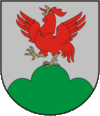Salantai
| Salantai | ||
|---|---|---|
| City | ||
| ||
 Salantai Location of Salantai | ||
| Coordinates: 56°4′0″N 21°34′0″E / 56.06667°N 21.56667°ECoordinates: 56°4′0″N 21°34′0″E / 56.06667°N 21.56667°E | ||
| Country |
| |
| Ethnographic region | Samogitia | |
| County |
| |
| Municipality | Kretinga district municipality | |
| Eldership | Salantai eldership | |
| Capital of | Salantai eldership | |
| First mentioned | 1556 | |
| Granted city rights | 1746 | |
| Population (2005) | ||
| • Total | 1,887 | |
| Time zone | EET (UTC+2) | |
| • Summer (DST) | EEST (UTC+3) | |
Salantai (![]() pronunciation ) is a small city in Lithuania. It is located in the Klaipėda County, Kretinga district.
pronunciation ) is a small city in Lithuania. It is located in the Klaipėda County, Kretinga district.
Etymology
Salantai is named after the Salantas River, which runs through the town. Both of their names are derived from the Lithuanian word "salantais" meaning "freezing."
History
This town is known for three famed rabbis: Rabbi Yisrael Lipkin Salanter and his teacher Rabbi Zundel Salant, rabbi Shmuel Salant, who spent most of his life in Salantai. Ashkenazi chief rabbi of Jerusalem between 1866 and 1910, also lived here before immigration. Aleksandras Bendikas, the Lithuanian book smuggler settled in Salantai. During the summer 1941, 95 Jews of the city were massacred in a mass execution by Lithuaniens nazis in the nearby forest.[1]
Culture
The Orvydas Farmstead located on the outskirts of Salantai is a sculpture park created by the Lithuanian artist Vilius Orvydas.[2]
External links
| Wikimedia Commons has media related to Salantai. |

